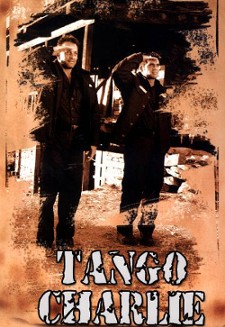
 |
 Tango Charlie is the code name for Sepoy Tarun Chauhan, enacted by Bobby Deol, who has been found lying injured and unconscious in the hills by two Indian Air Force helicopter pilots (Sunil Shetty and Sanjay Dutt in wasted cameos). They take him onto their helicopter in order to save him from dying. As they make their long journey to find the nearest treatment place for Bobby, they discover that the man has a diary. Unable to resist their own curiosity, they start reading the diary for a bit of amusement.
What was initially a source of amusement turns into an intriguing recollection of thoughts and events in the young man’s life. The diary takes us back to the time when Bobby began his vocation as a soldier for the Border Security Forces. We see him arriving at a camp where Havaldar Mohammed Ali (Ajay Devgan) is in charge. Initially labelling him as a “bewaqoof”, it takes Ali a while to warm to this new recruit. We are taken through passages of time where Tarun has to battle not only his enemies but also his conscience as he realises that war is ugly.
Tanishaa’s scenes distract the film from its main focus. Their love story starts just after the film kicks off with riveting sequences in the jungle. Perhaps Mani Shankar should have taken a tip from the story of “Cold Mountain” (by Charles Frazier and Anthony Minghella) where the romance begins before the war and the heroine reveals her thoughts in her letters to her departed beloved. Adopting this technique would have stopped Bobby’s character from having to take unnecessary trips home just to give Tanishaa (who plays Lachchi) a bit of screen time. Nandana Sen’s scenes are actually better as they are absorbing and dramatic.
For all its faults, “Tango Charlie” is an entertaining film. Gripping action scenes and effective dialogues are the main strengths. Mani Shankar also refrains from the overstated special effects and gobbledygook that blighted his directorial debut and last film, “Rudraksh”. His fondness for tacky special effects still manages to come to the fore at times. For example, when bullets are fired in action scenes, they create a visual rippling effect. Or how about the opening scene where the two pilots start fumbling around with the technology in their helicopter? It is interesting to note that the director himself has done the work for the special effects (without relying on a separate special effects crew). Still, he has evidently learned from the misfire that was “Rudraksh” and has concentrated more on telling the story this time round.
If you want to go and see a decent Bollywood war film, then watch “Tango Charlie”. I liked it more than other recent films in the same mould ala “L.O.C Kargil” and “Lakshya”.
|
| Comments | Contact Us | Advertise | Terms of Service | Privacy Policy |